We're celebrating each of the upcoming Honorary Oscar winners with a few pieces on their careers.
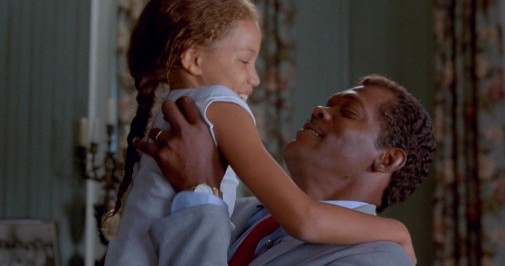
Previously in the "Honoraries" miniseries, Ben Miller and Lynn Lee looked at Samuel L. Jackson's work in two provocative indies, exploring the actor's innate intensity. Craig Brewer's Black Snake Moan reveals Jackson as a bluesman inflamed by spiritual purpose, while Quentin Tarantino's Pulp Fiction saw him play a hitman and resulted in the actor's only Oscar nomination. It should have also resulted in a victory, but that's a matter for another day, another article. This time, I shall investigate the complexities of his turn in Kasi Lemmons's Eve's Bayou. The director's debut feature was a passion project for many people involved, including Jackson, who also produced.
Such investment, such devotion, may be at the heart of his achievement. Not only is Eve's Bayou a masterpiece of 1990s American cinema, it also features one of Jackson's best performances…
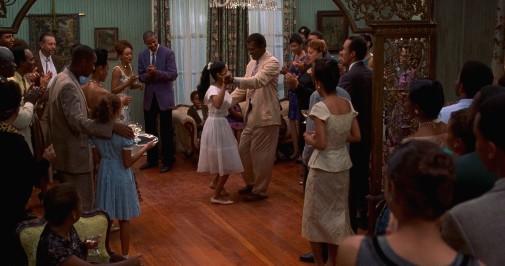
"Memory is a selection of images. Some elusive, others printed indelibly on the brain. The summer I killed my father, I was ten years old…" – the first words spoken in Eve's Bayou are striking, a shock of memoirist frankness. From this opening narration over black-and-white imagery to the story's conclusion, Lemmons negotiates the tonalities of Southern Gothic, the haunting qualities of old tradition and the vital youthfulness of a child's perspective. The narrative further unfolds with an oneiric edge, dreamy but also matter-of-fact, to the point of magical realism.
We're looking at the story through a prism of remembrance, the distortions of memory. The sense that everything has already happened further injects Eve's Bayou with a fateful force. It doesn't matter what anyone does since their tales are already fixed. The ending has been written, and reflection is all there is to do. Everyone is trapped in their path, unable to avoid what's to come though they still struggle. From their restlessness arises melodrama. Stormy and lustful, it's confusing to the young mind. Even for the remembering adult, the absolute truth remains out of reach.
Some scenes featuring mirrors encapsulate these themes, the film's juxtapositions, and paradoxes. They evoke a tenuous barrier between past and present, the dead and the living. That separating wall is so porous, nearly immaterial, a gentle whisper away from disintegrating. In the most memorable of these mirror moments, Debbi Morgan's genius performance is at the center of the staging, embodying Lemmons's complex ideas. Jackson plays with similar tools in a less demonstrative fashion. He's both a man imagined by his kid and the memory a present adult might invoke, an immediate mirage that's simultaneously a fragment of the re-examined past.
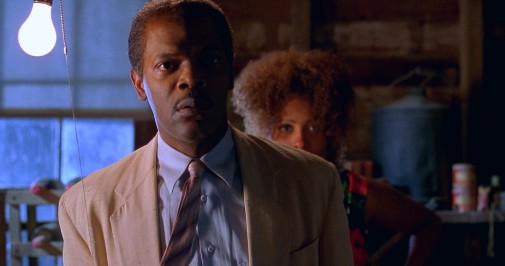
The actor is the doomed patriarch about which the introductory voice speaks, Louis Batiste. He's the best colored doctor in Louisiana, the descendent of the enslaved woman to whom Eve's Bayou was originally gifted and the enslaver who gave it to her. Jurnee Smollett breathes life into the patricidal youngster Eve Batiste, the middle child of the doctor's prosperous family. She has an older sister and younger brother, though the person she's closest to in the Batiste clan might be aunt Mozelle. Played by Morgan, she's a strange woman who some call mad.
Such accusations stem from her connection to the beyond. Gifted with insidious providence, she can look into everybody's futures but her own. This leaves the thrice widowed woman laden with guilt. She blames herself for not stopping what has been set in stone and not saving those near her. Like the doctor, there's much discord in her love life, infidelity, and drama. But, unlike Louis, Mozelle doesn't shake off her part in the misery, the responsibility of broken hearts. We shall return to the connections between these two, but, for now, let's focus on the brother's matrimonial betrayals.
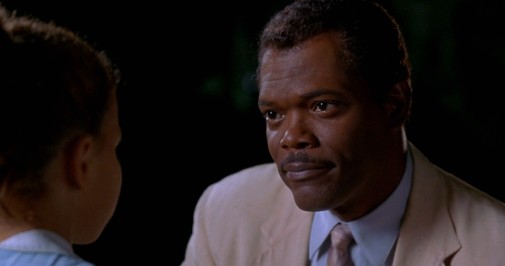
Eve's Bayou spans back in time and forwards, but its story focuses on that midcentury summer when Eve's dad died. It all starts when, one night, the girl's daughterly trust shatters in a million pieces. As she's hiding in shadow, Eve spies Louis being unfaithful with a family friend, and though he comforts her into silence, there's no mending the chasm that's just opened in the Batiste household. When caught by his daughter, one might expect Jackson to portray the doctor's shame as explosive. But no, the actor instead chooses a less predictable course, playing up paternal concern and a tender touch.
Jackson is dashing and gentle, promising Eve his attention, a dance, a killer smile. It's master manipulation, but it's also a father's natural care for his disconcerted daughter. We'll find out that's how Dr. Batiste gets away with his philandering ways, how he seduces and wins the hearts of countless women. He cares for them and shows that care in gentle gestures, touches them delicately, and grins like a matinée idol. Just as the past is the present, so is a lie a truth. For Dr. Batiste, love is a game of pretending, and pretend is an exercise in exaggeration.
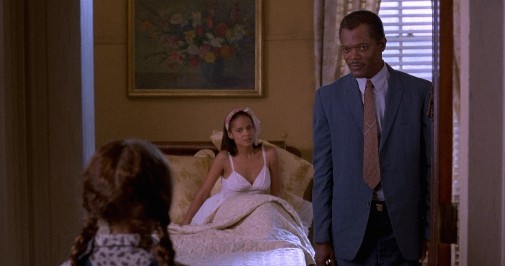
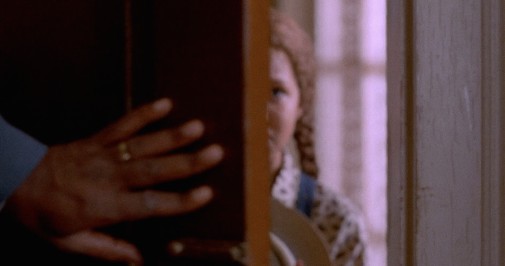
From the moment Eve sees proof of his affair, everything shall center on Dr. Louis and his choices, no matter that he's a supporting character in the grand scheme of things. The man's akin to the sun around which all the planets that form Eve's Bayou orbit, a disarming yet incandescent presence. Part of it is how Jackson acts the script, part of it is how Lemmons recognizes qualities the actor rarely explores in his work. Samuel L. Jackson's on-screen presence seldom reflects any potential sensuality despite his popularity. In this context, Eve's Bayou is an outstanding departure.
Here, the plot depends on his character's sexual proclivities, indiscretions, and bottomless needs. Moreover, the camera recognizes carnal magnetism when it regards the actor, complicating our understanding of the patriarch as seen through his progeny's eyes. As the plot unfolds, the blurred lines between his identity as a father and lover become a problem. They shall be told and re-told, incurring the casting of a voodoo curse. And so, like Mozelle, he is cursed. They are the same, and not just because Morgan and Jackson deliver the picture's best performances.
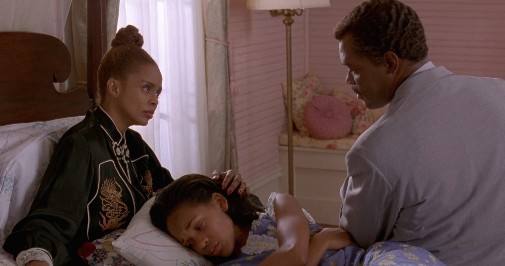
In Eve's Bayou, Louis and Mozelle are siblings and opposites, two sides of the same coin. He's a doctor, a man of science. She's a reader, a woman of mysticism. While both help the community, their emotional connections to its people are scarily distinct. He considers them flowers to pick, just as she yearns for a long-lasting bond, a field to plant herself into. He sees her as a madwoman. She sees him as a tragic man. However, they're both cursed by the shadow of death – the healer fated to die, the clairvoyant doomed to see her beloveds perish.
What's more critical, though, is how neither sibling can see their future. His vision is blocked by cocky recklessness, hers by a divine impediment. As a result, no matter their allure, their powers, neither can stop the tragedy announced in the picture's opening. And so, the moment of Louis's death arrives in all its horror. As witnessed by Eve, it's the sort of seismic shift capable of changing the course of a life, even a person's very sense of reality. And yet, the recollection that characterizes Eve's Bayou isn't a violent thing, no self-flagellating gesture. Instead, revisiting the past feels healing.
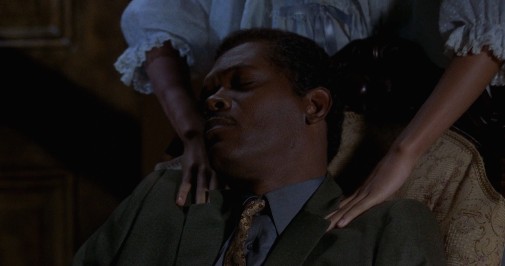
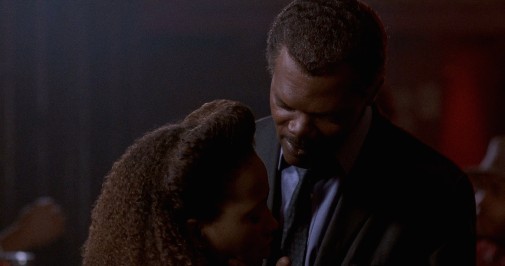
The cineastes seem to argue that hiding bad things beneath layers of subterfuge is more poisonous than the ugliest truth can ever be – look at the marriage of Eve's parents or, indeed, the Batiste's centuries-old legacy. The pretense of steadfast elegance and perfect joy is a façade with cracks all over. It's an infection of sublimated pain that gradually extends from one generation to the next. To be healed involves confronting that pain, learning from it. Only then can one co-exist with the ghosts that walk alongside the living, acknowledging how the present shall always be haunted by the past while not letting the phantasmagoria get in the way of life.
That's all to say that I'm grateful for Samuel L. Jackson. Grateful for his performance as Dr. Louis Batiste and for the role he played in getting Eve's Bayou made. He more than deserves his Oscar!
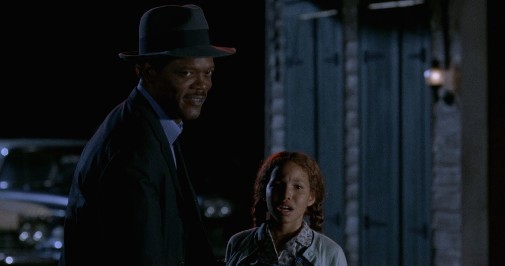
Previously on the Honoraries:
Samuel L. Jackson, Black Snake Moan
Samuel L. Jackson, Pulp Fiction
Liv Ullmann, Face to Face
Liv Ullmann, Shame
Liv Ullmann, Persona
Danny Glover, Producer
Danny Glover, To Sleep With Anger
Danny Glover, Places in the Heart
Elaine May, Ishtar
Elaine May, Mikey & Nicky
Elaine May, The Heartbreak Kid
Elaine May, A New Leaf